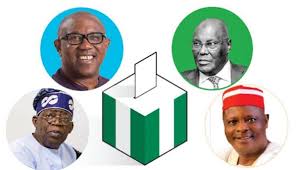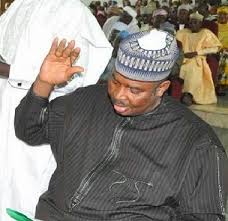By Ehichioya Ezomon
It’s apt to lead this article with the phrase – “Barring any political earthquake or a February surprise” – that closed previous instalments of the “Weekly Prediction” on the 2023 countdown series.
As noted in those two serials, only a novel political revolution could prevent the presidential ticket of the All Progressives Congress from winning the poll in the first ballot on February 25.
Hasn’t the “February surprise” occurred, courtesy of the Federal Government Naira redesign that has unleased untold hardship on Nigerians in peace time?
Nigerians have been unable to access their hard-earned money the government forced them to deposit in banks, in exchange for new N200, N500 and N1,000 notes.
Family and social lives are disrupted; businesses in the informal sector are grounded; and the overall outlook for the macro economy points southwards.
There’re street protests, leading to destructions and deaths, as hungry citizens vent anger on facilities of money deposit banks that refuse to dispense even the unaffected lower denominations at the ATM and over-the-counter points.
Collorary to inability to access money is a looming constitutional crisis that can result in breakdown of law and order and anarchy in the land.
President Buhari and Central Bank Governor Godwin Emefiele have refused to obey a Supreme Court order to pause the process of withdrawal of the old banknotes until a Writ by some State Governments for extension of the deadline was determined.
Following Buhari’s broadcast, making the old N200 note as legal tender till April 10, some State Governors have issued directives to residents to continue to transact businesses in N200, N500 and N1,000 banknotes under litigation.
These controversies may impact the electoral fortunes of the APC headed by Buhari, who craves to handover to the party candidates, former Lagos Governor Bola Ahmed Tinubu and former Borno Governor Kashim Shettima.
Buhari, who chairs the APC Presidential Campaign Council, has rallied for the Tinubu-Shettima ticket in several states, telling the rally goers that he would handover to Tinubu on May 29, 2023.
How could Buhari desire Tinubu as his successor, and yet introduce the currency redesign in the midst of a General Election in which Tinubu vies on the APC platform?
Speculations swirl that Buhari – directly or via the “Aso Rock cabal” – would sabotage the APC ticket, for power to remain in the North after his (Buhari) eight-year tenure.
Opposition elements have fed on these rumours for political gains; while some vocal APC governors have accused the Presidency of intents to ensure Tinubu and the party lose the 2023 poll.
How will Nigerians, reeling from the hardship imposed by the APC-controlled government, vote for Tinubu, who they blame for helping to form and fund the APC, and campaigning for the election and re-election of Buhari as president?
But three factors have helped Tinubu’s cause lately. One, Nigerians have begun to separate him from the unfavourable policies of the Buhari administration. Two, Tinubu has majorly been on the side of the people in their plight over the Naira redesign. Three, his appearance at an interview session with the Nigerian Economic Summit Group has had positive reviews, even by supporters of other candidates.
Tinubu, aware of concerns by Nigerians, has put up a robust campaign – backed to the hilt by the APC governors – to weather the seeming storms against him.
The strategy appeared to pay off – with Tinubu looking good to have the day on February 25 – before aftermaths of the Naira redesign threw a wrench in the works.
The next five days will determine if Tinubu will prevail amid scarcity of petrol and banknotes, and alleged plans by some Northern APC governors to declare poll support for former Vice President Atiku Abubakar of the Peoples Democratic Party.
Still, Tinubu’s prospects of a win were brightened last week by Rivers and Oyo states showing strong signs of an APC pick.
If that materialised, Tinubu would clear Borno, Cross River, Ekiti, Gombe, Jigawa, Kaduna, Katsina, Kogi, Kwara, Lagos, Nasarawa, Ogun, Ondo, Osun, Oyo, Rivers, Sokoko, Yobe and Zamfara. He could also pick all or some of Bauchi, Edo, Kano, Kebbi and the FCT.
Benue was moved to the Atiku and Delta State Governor Ifeanyi Okowa column last week due to PDP’s marathon rallies in Makurdi, Gboko and Oturpo on February 8.
But with full-throated adoption of former Anambra Governor Peter Obi by Governor Samuel Ortom, Benue has slipped from the PDP, leaving Atiku with six states of Adamawa, Akwa Ibom, Bayelsa, Delta, Plateau and Taraba.
Atiku may pick additional four states of Bauchi, Edo, Kano and Kebbi and the FCT, while he’s a net gain of 25% in over 30 states.
Doubts about Ortom’s genuine endorsement of the ticket of Obi and former Senator Yusuf Datti Baba-Ahmed evaporated on February 16 when Ortom roused a polical gathering for a drawn-out chant of “Obi”, “Obi”, “Obi”.
Flowing therefrom, Obi can secure straight wins in Abia, Anambra, Benue, Ebonyi, Enugu and Imo, and 25% spread in about 10 states.
There’s also a chance of success for Obi in the FCT, in regard to his catchment area voter-population in Abuja, and the audience that graced his rally on February 9.
Can the ticket of former Kano Governor Rabiu Musa Kwankwaso and Bishop Isaac Idahosa win Kano that’s under threats from the APC and PDP? The answer is in the air, even as it can secure 25% in four or five states.
Five days are a long time in politics for this week’s “Prediction” to be altered by unforeseen variables till the poll closes on February 25!
Mr Ezomon, Journalist and Media Consultant, writes from Lagos, Nigeria





